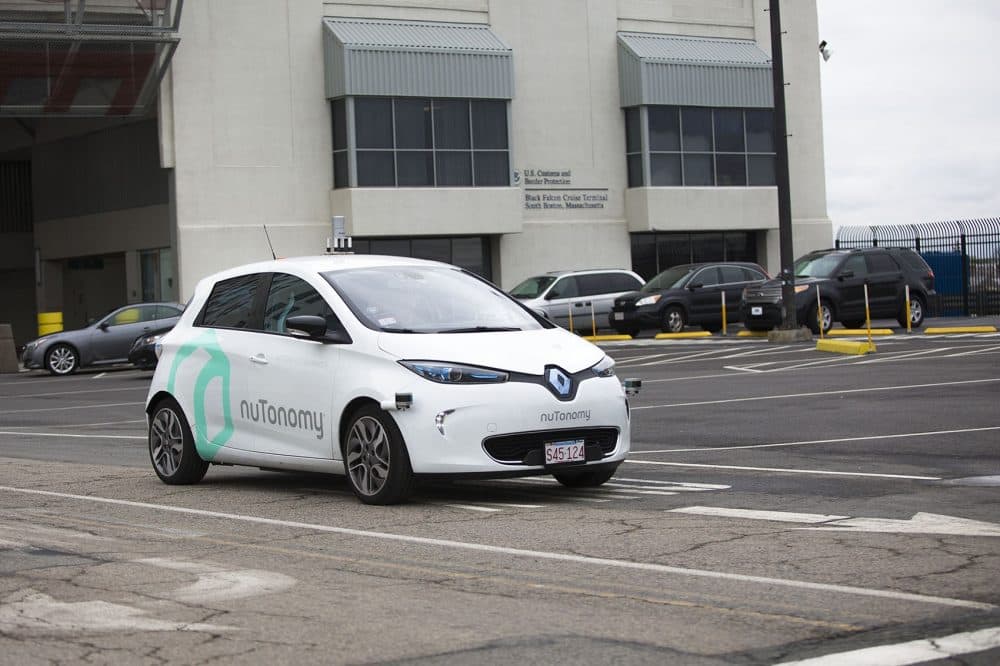Advertisement
Boston's Walsh Puts Self-Driving Vehicle Tests On Hold After Arizona Fatality

Boston has put its self-driving car testing program on hold after an autonomous Uber vehicle struck and killed a woman walking in Tempe, Arizona.
"We put the program on hold for a couple of days here to see what's going on," Boston Mayor Marty Walsh told reporters on Tuesday. "I think one of the things this tells us is we have to really look at who's going to be regulating this industry. The airline industry has regulations. The transportation industry has regulations."
The city has partnered with nuTonomy, Optimus Ride and Aptiv for on-street testing of self-driving technology in the Seaport. Nutonomy has branched out to test throughout the South Boston Seaport while the other two companies have been confined to the Raymond Flynn Marine Park.
The car that killed a 49-year-old woman in Arizona late Sunday night was in autonomous mode and a 44-year-old operator was behind the wheel of the vehicle, according to ABC15 Arizona, which reported the woman struck was walking outside of a crosswalk.
"It's a tragedy what happened yesterday," Walsh said, adding: "You also learn from terrible accidents like that."
Nutonomy has been "very responsive," said the mayor on his way into a grand reopening of a McDonald's in Downtown Crossing.
On Monday, Boston Transportation Commissioner Gina Fiandaca said the city had asked nuTonomy and Optimus Ride to "pause" their testing programs on public streets in Boston, according to the Boston Herald.
Larry Hanley, the president of the Amalgamated Transit Union, accused government officials around the country of issuing a "rubber stamp for autonomous vehicles without regard to the safety of the public." The union represents an assortment of people who work in the transportation industry.
"Allowing experimental self-driving technology to be tested on city streets is reckless and dangerous and not the answer for ending traffic fatalities. We need to quit using the public as the crash-test dummies. These systems are not ready to deal with the chaotic elements of our roads, traffic, vagaries of weather and other condition," Hanley said.
Saying he wants more "safeguards," Walsh noted that the testing is taking place in a mostly industrial section of the city.
"It's not like we have autonomous vehicles going through the streets of Boston where people are," Walsh said. "I think we still have to do the training and see what's going on."
Automotive companies are developing technology that could eventually enable a car to bring people from place to place without anyone minding the controls, and regulators and the public are trying to keep up. Around 5,000 pedestrians have died annually in traffic crashes in recent years, according to federal statistics.
Sunday's incident marked the first known time that an autonomous vehicle killed a pedestrian on a public road.
"There's going to be other incidences I think that will happen as we move forward here, but it's how do you come up with a system that's as close to perfect as possible," said Walsh, who said the "bike community has some concerns" about the ability to detect cyclists.
Hanley said government must watch out for "profiteers."
"We are helpless bystanders caught in a corporate gold rush while these profiteers rush these self-driving multi-ton missiles onto our streets and highways long before they are ready. The bottom line is protect people before profit. It’s time to put the brakes on autonomous vehicles."
Bills regulating autonomous vehicles are pending in Congress and in state legislatures. In Massachusetts autonomous vehicles have so far languished in the Transportation Committee for the duration of the 2017-2018 session.